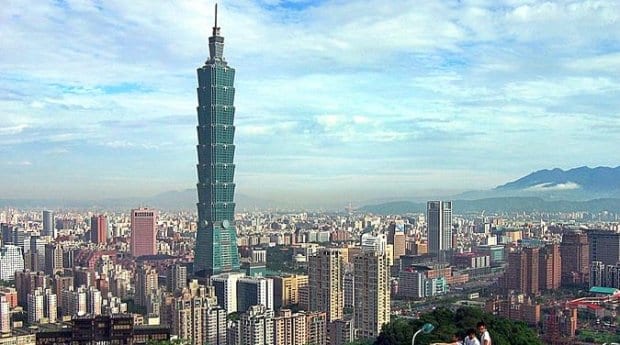Taipei, the national capital of Taiwan, is the country’s political, economic, scientific, military and cultural centre and is a global leader in cutting-edge computer and electronics technologies.
Part of the best collection of Chinese art in the world is here, at the National Palace Museum: half the collection of the emperors from the Forbidden Ciy in Beijing, known as the Taipei Gugong, representing more than 10,000 years of Chinese arts and history. A more traditional Chinese society survives here, too, without some of the changes found on the mainland after decades of Communism.
Perhaps the best Chinese food in the world can be enjoyed in Taiwan, its variety reflecting the influences of many regions: noodles from South China and soups from Fujian, mixed in with local Taiwanese fare, a natural mélange of island rustic foods, heavy on pork and shrimp paste, using roots and dried fish for more complex flavours. A wide assortment of international cuisines are also represented. In the opinion of many reviewers, Taiwanese street food ranks with the best and costs very little.
The Taiwanese gay population is probably among the friendliest on Earth, and tourists flock here from other Asian cities like Singapore, Seoul, Tokyo and Hong Kong. Open and welcoming to foreigners, the guys appear genuine in their concern that everyone has a good time on their island. Less visible than the gay men, lesbians are equally welcoming, and most women have only to visit the right café or go to a dance event organized by LezMeeting to fit right in.
Gay rights
Under Chiang Kai-chek, leader of the Republic of China from 1928 to 1975, the government mostly ignored homosexuality, preferring to insist it didn’t exist. Men cruised New Park (now 2-28 Park) and the government put up lights and cleared the underbrush, but police didn’t launch the kind of anti-gay crackdowns seen in many pre-Stonewall Western societies. Prostitution in the red light district of Wanhua wasn’t “cleaned up’’ until long after Chiang’s death.
Today Taiwan ranks among the most “progressive’’ countries in Asia, and adult, private, consensual, same-sex sexual activity is legal. Sexual orientation discrimination in education was banned in 2003, and 2007 legislation banned such discrimination in the workplace. The LGBT Pride parade each October is one of Asia’s largest, drawing approximately 60,000 people. Men still cruise 2-28 Park, but phone app hookups are as popular here as anywhere, and sex workers no longer need red lights in their windows. Same-sex marriage legislation, however, first proposed in 2003, has stalled. Worse still, Taiwan is said by Utopia-Asia to deport HIV-positive foreigners. They advise those who are positive not to tell the visa office and to do an anonymous test before being tested for a work visa.
Neighbourhoods
Among the 12 districts of Taipei City, these are the most interesting for gay and lesbian visitors:
- Wanhua: the oldest district in Taipei, made up of 36 villages, home to “gay village” businesses clustered around The Red House, among a number of historic buildings, such as the Longshan Temple, built during years of Japanese rule. Here too is Ximending, the city’s centre for fashion, theatre, music, herbs, open-air markets, alternative subcultures and things Japanese, with many shops, night markets and department stores along pedestrian-only streets. Elements of the former “red light district” remain just out of sight, despite a 1990s “clean-up.’’ Get off the metro at Ximen MRT Station for the Red House.
- Zhongshan: featuring parks and recreation areas, the Xingtian Temple, a thriving nightlife scene that includes gay clubs, cafés and shops, plus the Fine Arts Museum.
- Da’an: known for the shopping district on and around Zhongxiao East Road and Dunhua South Road, with specialty boutiques, department stores and fashionable restaurants, plus three major national universities and several museums. For gay clubbing, check out the Luxy, plus several lesbian-popular cafés, such as the Love Lez. The East Metro Market runs beneath Zhongxiao Road between metro stations; find the Tonghua Night Market on the east side, the Shida Night Market to the west.
- Xinyi: adjacent to Da’an, has government buildings, a financial district, the Taipei 101 tower and World Trade Center, large shopping malls and luxury hotels.
- Songshan: the city’s oldest district, also a financial centre and home to the Raohe Street Night Market, Songshan Airport, the University of Taipei and the Taipei Arena.
- Beitou: in the northernmost suburbs, it has the most mountainous and highest area of the city, with the Yangmingshan National Park, geothermal hot springs and spas that include theKawayu, popular with gay men.
Gay scene
A thriving “gay boy’’ culture has emerged in Taipei over the past few years, and bears are well represented, too, prompting some people to call this city “the new Bangkok,” with many bars, dance clubs, saunas, massage spas and hot springs.
Gay clubbers and partygoers come here from all around the region and beyond for world-class dance parties and circuit festivals. The businesses we list are those most accessible to visitors, but a wider, Chinese-language-only LGBT community exists for anyone who speaks the language, with many small locals’ clubs. This is particularly true in the much lower-profile lesbian community, a much larger scene than one might think on first impression or judging by media listings.
Women visitors can check out the lesbian-popular cafés and shops, including Love Boat, to get oriented, be welcomed and very likely shown around by friendly locals.
For the most up-to-date travel information on gay Taipei, see our City Guide, Listings Guide, Events Guide and Activities Guide.
Where possible in our map listings we include business names and addresses in Chinese, to show taxi drivers or others who don’t speak English.

 Why you can trust Xtra
Why you can trust Xtra